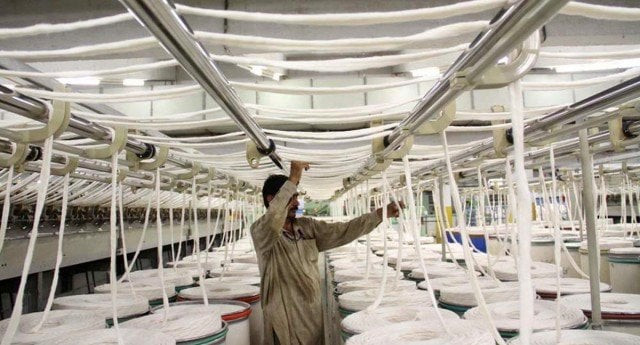Textile millers say exports $9b below potential
Argue grid prices not financially viable, regionally competitive

Textile millers have voiced concern over the ongoing challenges faced by the industry as it has substantially underperformed in export markets, trailing by $9 billion compared to its actual potential.
A high-level delegation of the All Pakistan Textile Mills Association (Aptma), comprising Chairman Kamran Arshad, Chairman North Asad Shafi, Chairman South Naveed Ahmed and others, met Minister of State for Finance and Revenue Ali Pervaiz Malik and senior officials of the Federal Board of Revenue to discuss the issues afflicting the industry.
They acknowledged Pakistan's successful negotiations with the IMF for a $7 billion loan programme, which would be instrumental in stabilising the economy. While appreciating the government's efforts to reduce cross-subsidy in the industrial power tariff, the delegation of millers stressed that there was still a long way to go in making electricity grid prices financially viable and regionally competitive.
The tariff currently stands at around 15 cents per kWh, despite a substantial reduction in the cross-subsidy, compared to 6-9 cents per kWh in regional economies like India, Bangladesh and Vietnam. They highlighted a critical issue where the government had agreed with the IMF to cease gas supply to the captive power plants (CPPs) of industrial units by the end of December 2024. The textile millers emphasised that the industries currently reliant on gas-fired captive power production were unlikely to switch to the national grid given its financial unviability. "If gas supply to the CPPs is cut off, they will either seek alternative energy sources or shut their operations," Aptma said and urged the government to revisit its policy.
Another major issue that came up for discussion was the withdrawal of zero-rating facility, or sales tax exemption, for the local supplies required for manufacturing export goods under the Export Facilitation Scheme.
This has caused exporters to shift from the domestically produced inputs to the imported raw material as 18% sales tax on local supplies, though refundable, takes months in processing, putting a strain on liquidity and increasing the cost of production.
According to Aptma, the withdrawal of tax exemptions has particularly impacted the spinning sector.
By June 2024, yarn production had plummeted 41%, while cotton yarn imports surged 435% YoY in August 2024. Over 40% of the spinning units have shut down, leading to widespread unemployment and the loss of livelihoods.
The association members also highlighted the growing misuse of Export Facilitation Scheme, where yarn imported under the scheme for the manufacturing of exportable goods was being illegally sold in the domestic market to the detriment of the textile industry.


















COMMENTS
Comments are moderated and generally will be posted if they are on-topic and not abusive.
For more information, please see our Comments FAQ